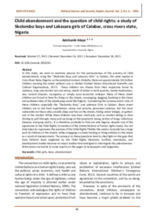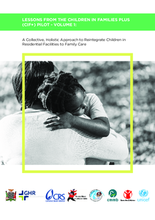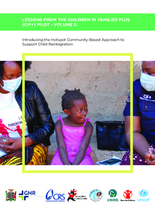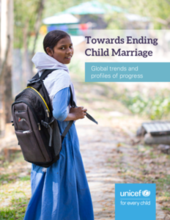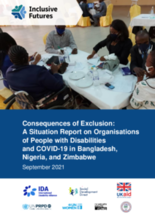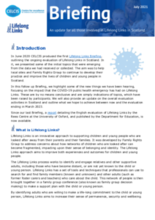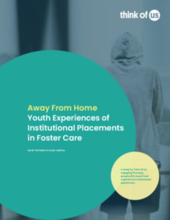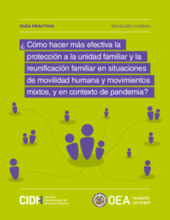Displaying 51 - 60 of 505
This study examined the reasons for the pervasiveness of the practice of child abandonment, using the “Skolombo Boys and Lakasara Girls’’ in Calabar, the state capital of Cross River State, Nigeria, as the analytical context.
The CIF+ pilot is a collaborative, locally led, intensive effort with the main aim to reintegrate 200 children from Child Care Facilities (CCFs) in Lusaka district, into families over a period of three years (2019-2021).
To complement the CIF partner interventions targeting the child and family and to enhance the sustainability of reintegration efforts, the project is using a Hotspot approach to address community-level, environmental factors that may contribute to a child’s increased risk of family separation. The collective application of the Hotspot approach is completely innovative in the Zambian child care reform space. In this brief, we spotlight the Hotspot approach and promising observations to date in undertaking this strategy.
Adolescents living in residential youth care (RYC) are at risk for disadvantaged social relationships, which in turn present a risk factor for increased loneliness. Social relationships of Slovenian adolescents aged 15–18 years and living in RYC group homes or in their primary families were investigated by relying on the social convoy framework.
Left-behind children (LBC) are a social and educational concern in China. Researchers have identified psychological and behavioural effects on LBC. This study creates a profile of LBC in rural Sichuan and identifies life and values education (LVE) as a beneficial intervention.
The analysis presented in this report looks at historical trends in child marriage, with a focus on selected countries that have recorded significant declines in child marriage prevalence. It offers an overview of changes in the practice together with a review of other shifts that have occurred in these countries in terms of girls’ access to education and employment opportunities, as well as economic development and poverty reduction.
The COVID-19 pandemic has exacerbated inequalities and barriers to
social inclusion for people with disabilities. These experiences of social
exclusion have been felt to an even greater extent by women with disabilities
and under-represented groups of people with disabilities, leading to a range of
effects on the operations and priorities of OPDs. To address a critical gap in the
evidence base, the Disability Inclusion Helpdesk carried out a rapid assessment
of the role of OPDs during the pandemic, and how the pandemic has affected
OPDs’ operations and priorities.
In June 2020 CELCIS produced the first Lifelong Links Briefing, outlining the ongoing evaluation of Lifelong Links in Scotland. In it, we presented some of the initial topics that were emerging from the data we had received or collected. The aim was to help local sites and Family Rights Group to continue to develop their practice and improve the lives of children and young people in Scotland.
This study provides a deep, nuanced understanding of the lived experience and mental models of young people who have recently lived in institutional placements while in foster care. It offers an understanding of institutional placements from youths’ perspectives.
la Comisión Interamericana presenta la guía ¿Cómo hacer más
efectiva la protección a la unidad familiar y reunificar a la familia en los procedimientos migratorios y de protección en contexto de pandemia? en la que
se analizan los estándares interamericanos aplicables a la luz de las obligaciones
internacionales de los Estados y propone recomendaciones para garantizar la unidad
familiar y la reunificación familiar así como prevenir los riesgos de separación y minimizar los impactos en los casos de separación familiar. Asimismo, la implementación
de las garantías de la reunificación familiar requiere muchas veces de una estrategia idónea de acceso a mecanismos de regularización documental, así como de condiciones seguras de viaje y movilidad a través de las fronteras nacionales. Esto es especialmente benéfico para familias que se han visto separadas de manera forzada o por
razones asociadas a la movilidad humana.

